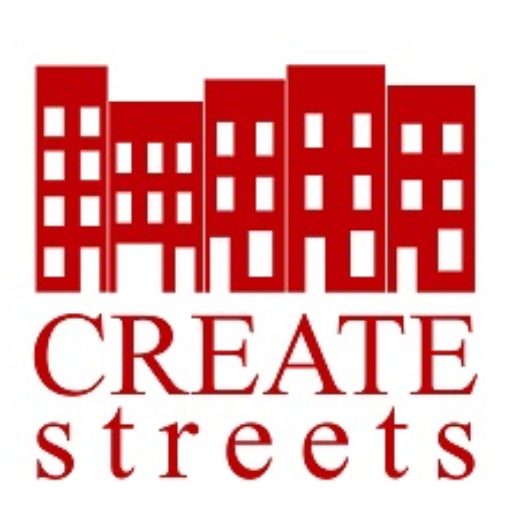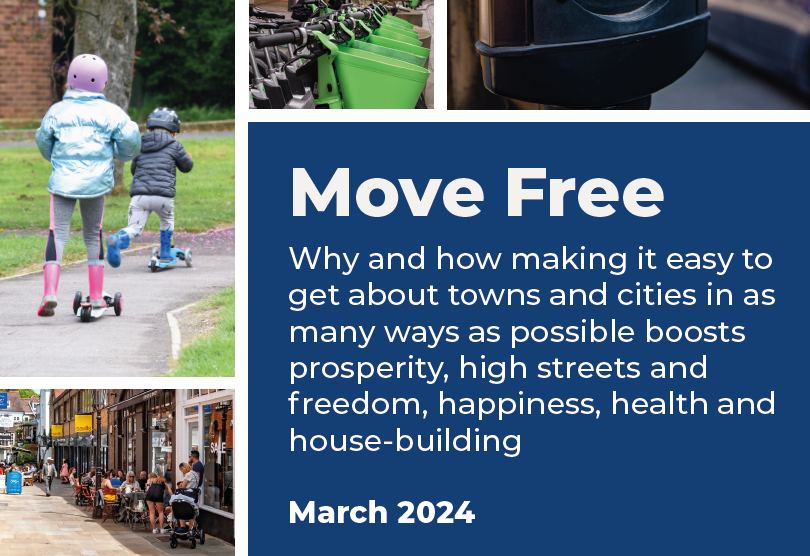March 19th, 2024
The ‘Move Free’ report from Create Streets explores why and how making it easy to get about towns and cities in as many ways as possible boosts prosperity, high streets and freedom, happiness, health and house-building. You can read the executive summary below and the full report here.
-
- Twin inventions. In a quirk of history, the ‘safety bicycle’ and the internal combustion engine car were invented within the same few months in 1884-5. The bicycle’s success was more immediate (there was an 1890s ‘bike boom’). However, the success of the ‘slower burn’ invention, the car, has been far more radical and profound for our towns and cities. Now people increasingly think this has had disadvantages as well as advantages. Are they right?
-
- Prosperity: how more movement makes us richer. The more we can make it easier to move about from any one point to any other point and the more we can limit the polluting downsides of movement to others then the more prosperity the citizens of a town or city can generate. More movement, more pleasingly conducted between more places generates more value for more of us and makes for more prosperous places and economies. This can be measured though land values: more walkable neighbourhoods are typically worth between 10 and 55 per cent more in controlled studies. In towns, cars are just not very good at moving lots of people around. The same street lane can move 21 per cent as many people by car as it can move bike.
-
- Purchasing: how more movement makes high streets more successful. Town centres and high streets that flourish with the best commercial performance are the ones that are safe and easy to reach and not entirely dependent on cars or dominated by fast and polluting vehicles once you are there. Retail sales increase by an average of 30 per cent following projects that improve pedestrian, cycling or public transport access to shops.
-
- Place: how more movement makes us happier and healthier. Physical activity, such as walking or cycling, is positively correlated with happiness, health and wellbeing and is most effective when it is deeply integrated into our daily lives for example in how we move about to get to work or school. This is particularly true as we age. 10,000 steps a day reduces the risk from dementia by 50 per cent. Dirty air from cars and their tyres is also very bad for us, causing around 40,000 early deaths in the UK each year.
-
- People: how more movement makes us more free. Cars empower and liberate their users to move around with comfort, ease and relative safety. However, they can also diminish liberty. They are ineffective and inefficient ways of moving around cities and towns. One of the greatest liberty losses of the past century has been the child’s loss of liberty to move around his or her neighbourhood, a 97 per cent reduction in one study from several miles to almost nothing at all. This has been bad for children and their parents.
-
- Property: how more movement can make more homes. By creating more places in which it is easy to get about by bike, foot or public transport as well as by car and by retrofitting existing places to be like this, we can help create more homes on less land (the gift of ‘gentle density’) than by the infrastructure-heavy route we are currently taking. On the same amount of land that was used for greenfield development last year we might have built not 112,240 homes but 220,471 homes if we had developed at an historic ‘gentle density’ of, say, 55 homes per hectare instead of 28.
-
- Conclusion: why and how to fight the fight for better places. Cars are great. Cars are awful. Cars can boost liberty. Cars can destroy it. Cars can help the economy. Cars can undermine it. It is largely a question of where. They add most value in areas of lowest density. They add least and do most harm in areas of higher density. When it comes to freeing up our streets, our advice to decisionmakers is:
• add choice and let people decide with their hearts and heads;
• think about place not just about movement; and
• find gradualist ‘win-win’ processes for improving places with the consent, even with the active leadership, of local neighbourhoods.
Read the full report here
Our report has been covered in ConservativeHome and The Guardian
Here are specific British policy suggestions to make it easier to move around our towns and cities in as many ways as possible to boost prosperity, health and the supply of new homes.


